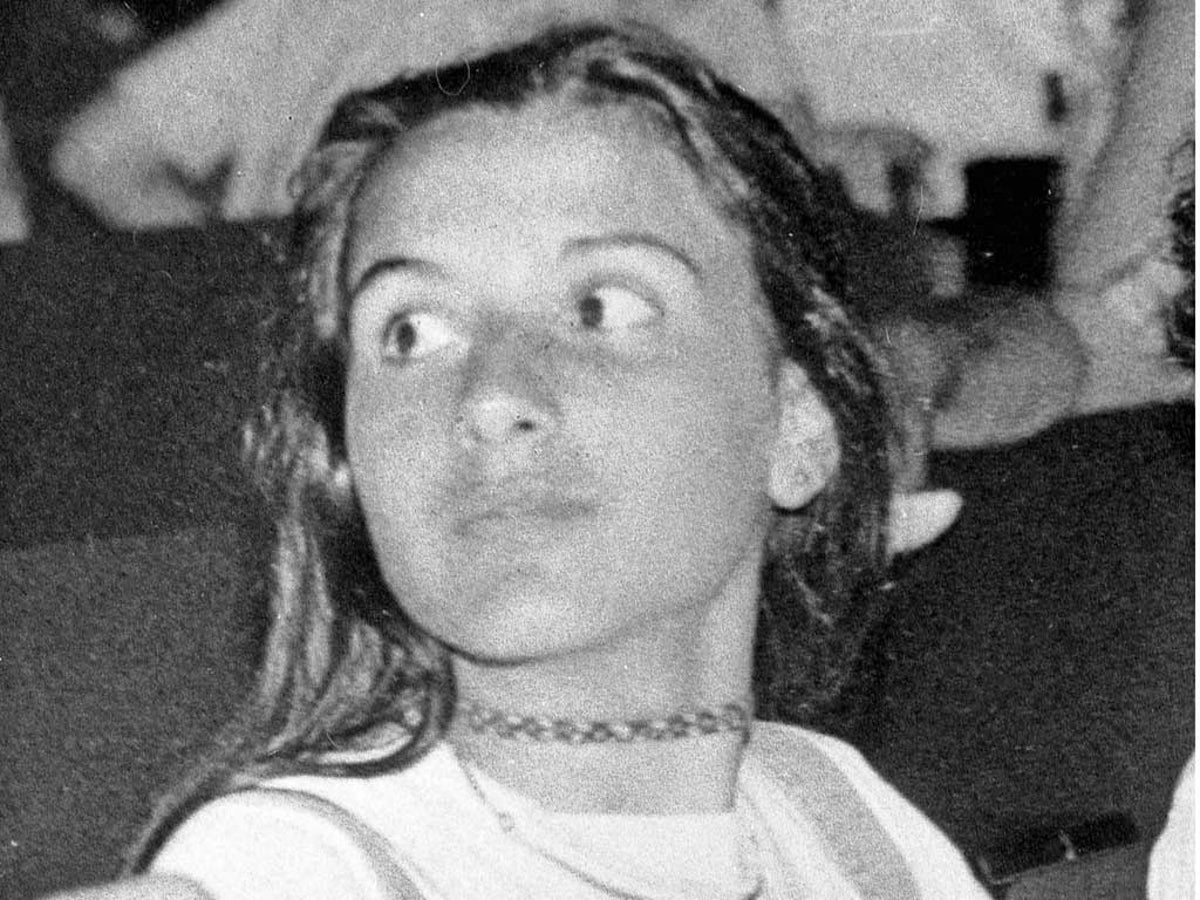
The motivation behind most kidnappings emerges without much digging.
But nearly 40 years after Emanuela Orlandi went missing, her family is still on a quest to find out why she was targeted one fateful evening in 1983. The 15-year-old daughter of a Vatican employee, Emanuela vanished on her way home from a flute lesson in Rome and her whereabouts remain unknown to this day.
The myriad of unsubstantiated theories behind her kidnapping range from a supposed plot by the KGB to release a man who tried to assassinate Pope John Paul II, to claims that the abduction was orchestrated by senior staff at the Vatican and executed by members of the Italian mafia Banda Della Magliana— right after Emanuela allegedly told a friend that “someone close to the Pope” made sexual advances towards her.
The case and first-hand testimonies from witnesses, none of which have yielded concrete leads for investigators or brought definitive answers for the family for decades, were revisited in the Netflix documentary Vatican Girl: The Disappearance of Emanuela Orlandi, released last October.
The four-part film brought renewed interest into what remains the Vatican’s only open missing person case, with the city’s top prosecutor Alessandro Diddi announcing on 10 January that he would be reopening an investigation into the cold case, local media reported.
The Orlandi family, who have maintained that the Vatican is withholding vital information, welcomed the development with caution, warning that they are expecting a “serious” investigation and not “[more] propaganda,” Anadolu Agency reported. At a sit-in near the Vatican on what would have been Emanuela’s 55th birthday, her brother Pietro Orlandi pointed at a poster with the images of the last three Popes and the words “silence makes them accomplices” in Italian.
“To me, she is not dead and I will not quit [looking for her] until the remains are found. It is a duty to continue looking for her,” Mr Pietro said on Saturday, speaking in Italian, according to TODAY Attualità.
The Orlandi family’s attorney Laura Sgro also told Italian news agency Il Fatto Quotidiano that they believed at least a dozen of people “immediately available” to the prosecution should be interrogated in the newly opened investigation.
It is the first time that the Vatican has initiated a formal investigation into the kidnapping. For years, the state has said that while it intended to fully cooperate with officials, the abduction had taken place on Italian soil, per the New York Times.
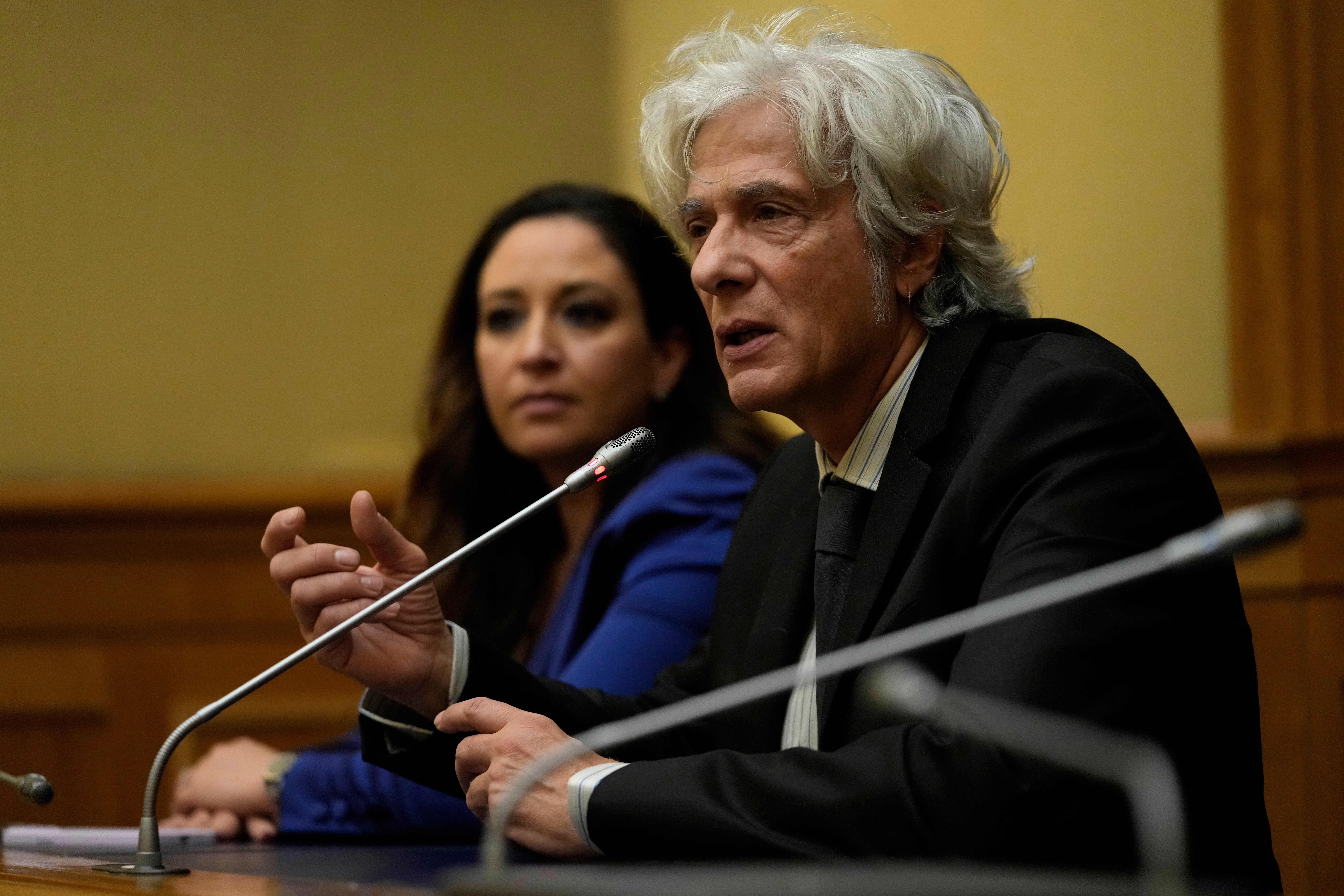
Ms Sgro and Mr Orlandi also announced a new initiative last month to convene a parliamentary commission of inquest into the case.
Three previous initiatives in the Italian Parliament failed to get off the ground, but Ms Sgro and opposition lawmaker Carlo Calenda insisted that the Vatican couldn’t consider the case closed when there were so many questions left unanswered, according to the Associated Press.
The beginning of a four-decades-old mystery
Emanuela’s father Ercole Orlandi worked as a messenger for the Vatican and the family lived in Vatican City State.
She vanished on 22 June 1983 after leaving her family’s Vatican City apartment to go to a music lesson in Rome.
Before disappearing, Emanuela phoned her house and said that a male representative from Avon had approached her and offered her a job.
According to the documentary, the family received several mysterious calls in the aftermath of the abduction. The first calls alerted them that a girl resembling Emanuela but by the name of “Barbara” or “Barbarella” had reportedly told the callers she had decided to run away from home.
Emanuela’s family contacted the police the same day she vanished but was urged not to report her missing until the next day.
Posters with her face were shared throughout the city and the missing person’s case soon gripped the entire nation.
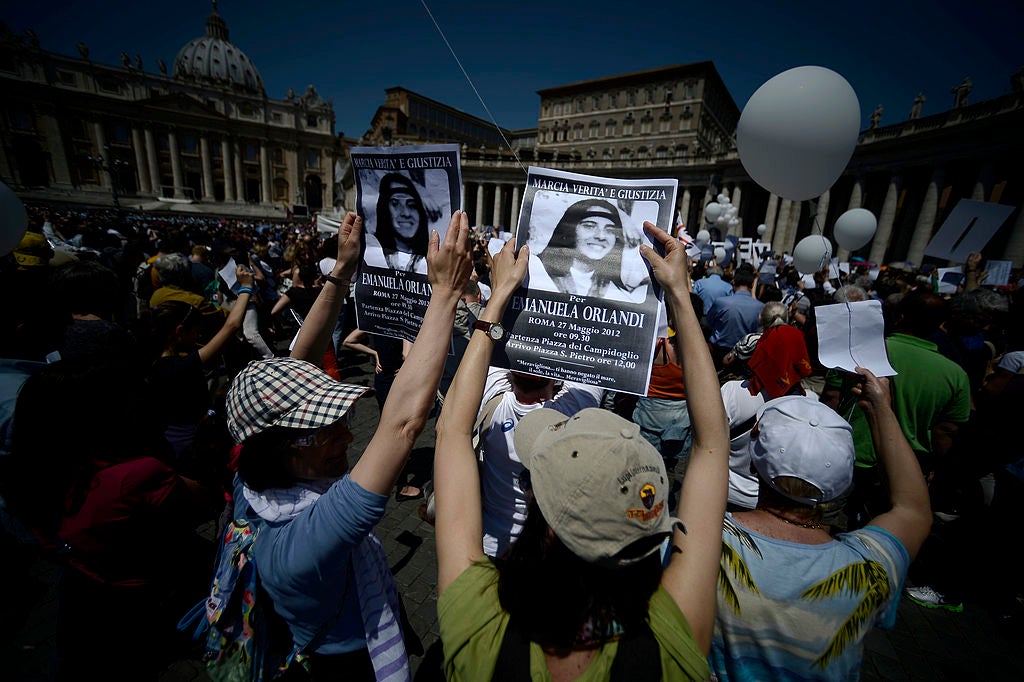
Pope John Paul II even appealed to her captors while delivering his angelus a week after the abduction, and fruitlessly pleaded for them to set her free.
The following calls grew increasingly dark, with a man later dubbed “il Americano” — The American — saying that Emanuela would soon be killed. At one point, the family received a recording of a woman wailing in pain.
A family representative told United Press International (UPI) at the time that they believed the disturbing sounds were not made by Emanuela, but other parts of the recording were believed to be her voice.
Since then, the family has received a plethora of tips and leads from people claiming to be behind or pointing the finger at the Vatican for plotting Emanuela’s kidnapping. To this day, no theory has been confirmed.
An unlikely trade-in
One of the mysterious callers first claimed that they had captured Emanuela to demand the release of Mehmet Ali Ağca, a Turkish national who shot John Paul in 1981.
The theory gained momentum also because, on the day of Emanuela’s kidnapping, the Pope had returned to his native Poland for a visit, leading the public to believe that the abduction had been carefully planned in an attempt to send a message to the Vatican.
According to the documentary, officials investigating the kidnappings still struggled to identify what organisation was behind it. That was in part because Ağca changed the story about who ordered the Pope’s assassination.
Throughout the years, Ağca has alleged he acted on behalf of the right-wing Turkish terrorist group Gray Wolves, which he was a member of, and later saying the Soviet intelligence service KGB was actually behind the plot, per The History Channel.
Ağca claimed in a 1985 prison interview that Emanuela had indeed been taken in exchange for his freedom, the Ocala Star-Banner reported — and said that she “was safe, not in danger,” but offered no further proof.
Ağca served 20 years in an Italian prison before he was extradited to Turkey in 2000. He was released on parole in 2006.
The Vatican Bank’s alleged links to the criminal underworld
In the Netflix documentary, a former lover of Banda Della Magliana mafia boss Enrico De Pedis claims that she held Emanuela in her apartment at the request of De Pedis. The woman, Sabrina Minardi, alleged the teen was at her apartment for 10 days before she was returned to a man “dressed as a priest” near the Vatican.
Minardi, who first came forward with her testimony to a journalist at the Italian television programme Chi l’ha visto?, also said on the Netflix series that De Pedis had told her the abduction stemmed from a game “of power.”
In 2011, once member of the Banda della Magliana Antonio Mancini also told the Italian outlet La Stampa that Emanuela had been kidnapped to force the Vatican to return large sums of money purportedly lent to its bank by criminal organisations.
In 2012, De Pedis’ body was exhumed from the crypt of a Roman basilica. The search turned up no link.
The Vatican ‘stolen’ papers
In 2017, Italian investigative journalist Emiliano Fittipaldi published a five-page document that was allegedly stolen from a locked cabinet in the Vatican.
Mr Fittipaldi was also prosecuted and cleared by an Italian court for publishing financial documents stolen from the Vatican known as “Vatileaks,” per Reuters.
The journalist said the document pertaining to Emanuela, allegedly written by a cardinal, listed expenses for Emanuela’s accommodations in London between 1983 and 1997. On Vatican Girl, Mr Fittipaldi theorises even further that a final large expense would explain the potential transport of Emanuela’s body back to Italy.
The Vatican has denied the authenticity of the document.
The sex abuse theory
In 2012, Father Gabriele Amorth, once the leading exorcist at the Vatican, told Italian newspaper La Stampa that Emanuela had been kidnapped for sexual exploitation.
“It has already previously been stated by (deceased) monsignor Simeone Duca, an archivist at the Vatican, who was asked to recruit girls for parties with the help of the Vatican gendarmes,” a translation of Amorth’s interview by The Belfast Telegraph reads.
“The network involved diplomatic personnel from a foreign embassy to the Holy See. I believe Emanuela ended up a victim of this circle.”
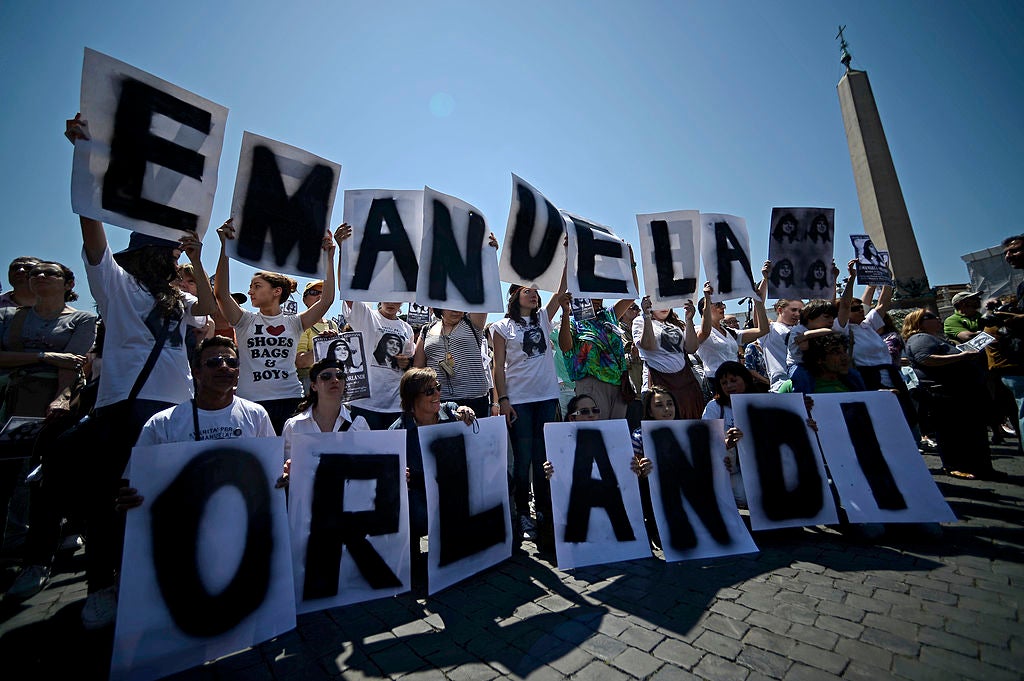
In the Netflix series, a high school friend of Emanuela came forward with claims that the missing girl had phoned her just a week before she went missing to confide that “someone close to the Pope” had “bothered her” while she was strolling in the Vatican gardens.
The friend, who asked not to be named, said Emanuela communicated the person in question had made sexual advances towards her.
The empty tombs
In 2017, the Orlandi family attorney received an anonymous letter suggesting her remains were buried in the Teutonic Cemetery in Vatican city.
The letter referred to a marble statue of an angel above a tomb where two German princesses were believed buried and said: “Look where the angel is pointing.”
The tomb turned out to be completely empty and the lack of a discovery only raised new questions.
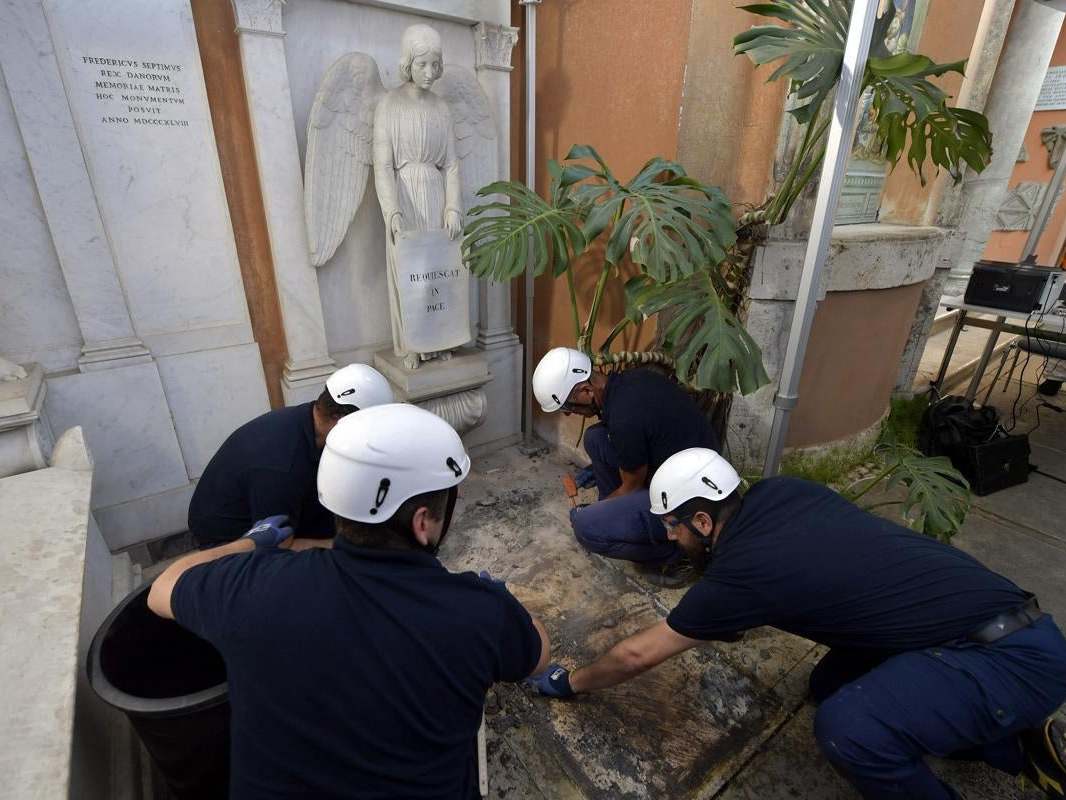
The Vatican said in a statement at the time that the opening of the tombs “yielded a negative outcome. No human remains nor funereal urns were found.”
It said the inspection of Princess Sophie von Hohenlohe’s tomb turned up an underground chamber measuring roughly 4 by 3.7 metres (13 by 12 feet) that was “completely empty.” Then the stone lid of an adjacent sarcophagus of Princess Charlotte Federica di Mecklenburg was removed and inside “no human remains were found,” the Vatican said.
A relentless quest to find Emanuela
For 40 years, Pietro Orlandi and his siblings have continued to lead efforts to find Emanuela.
The new inquest into Emanuela’s disappearance has brought new hope that her family could finally get long-awaited and relentlessly sought answers.
When interviewed for Vatican Girl, Mr Orlandi said that during an exchange with Pope Francis shortly after he became Pope, the pontiff told him that Emanuela “is in heaven.” The Vatican has long denied any connection to the kidnapping while vowing to cooperate with the investigation.
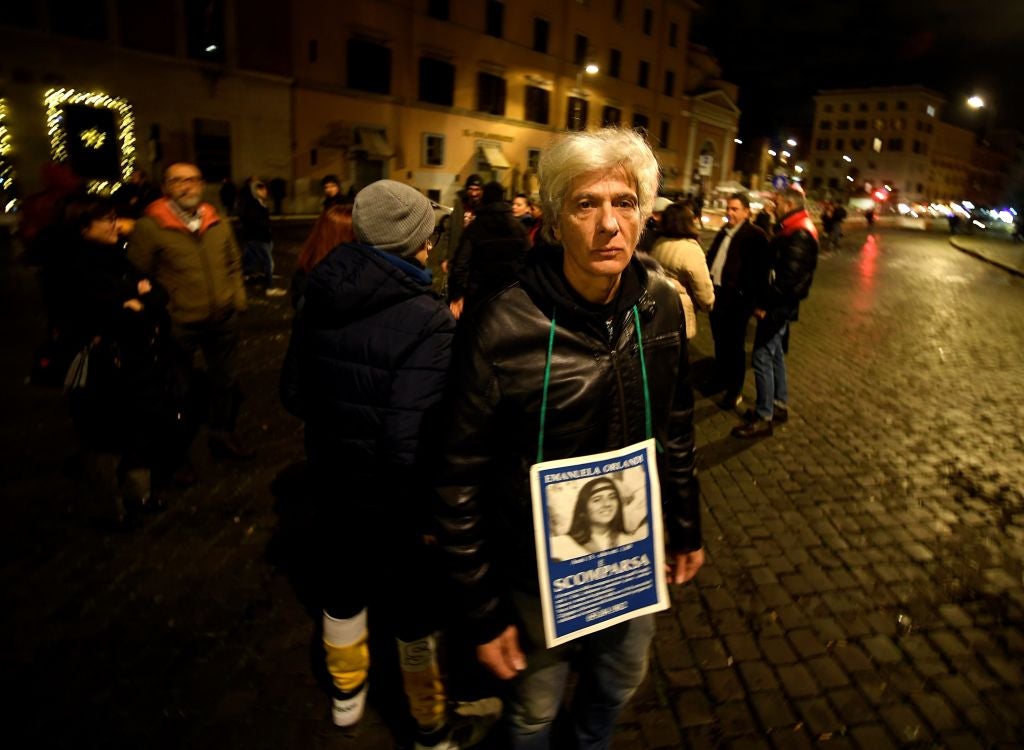
Mr Orlandi has said he only wishes for the truth to finally come to light, so his 92-year-old mother “can at least bring flowers to [Emanuela’s] grave,” if she is dead.
“The only thing I’m sure of is that in the Vatican, they know the truth,” Mr Orlandi says in the Netflix series. “They know what happened that day and now I’m asking them to speak that truth because it is about time they did. Too many years have gone by.”
The Independent has reached out to the Vatican’s press office for comment.







